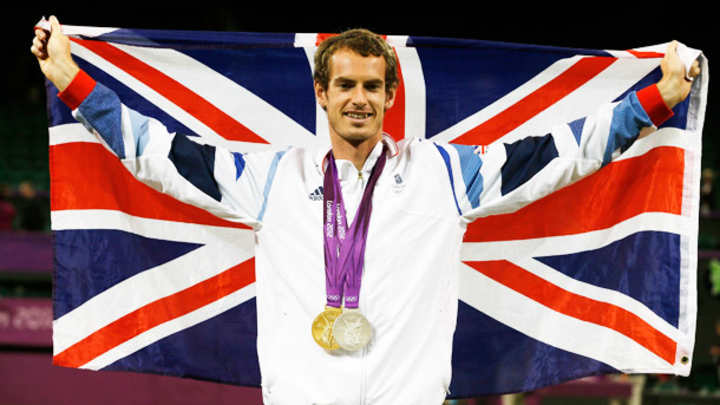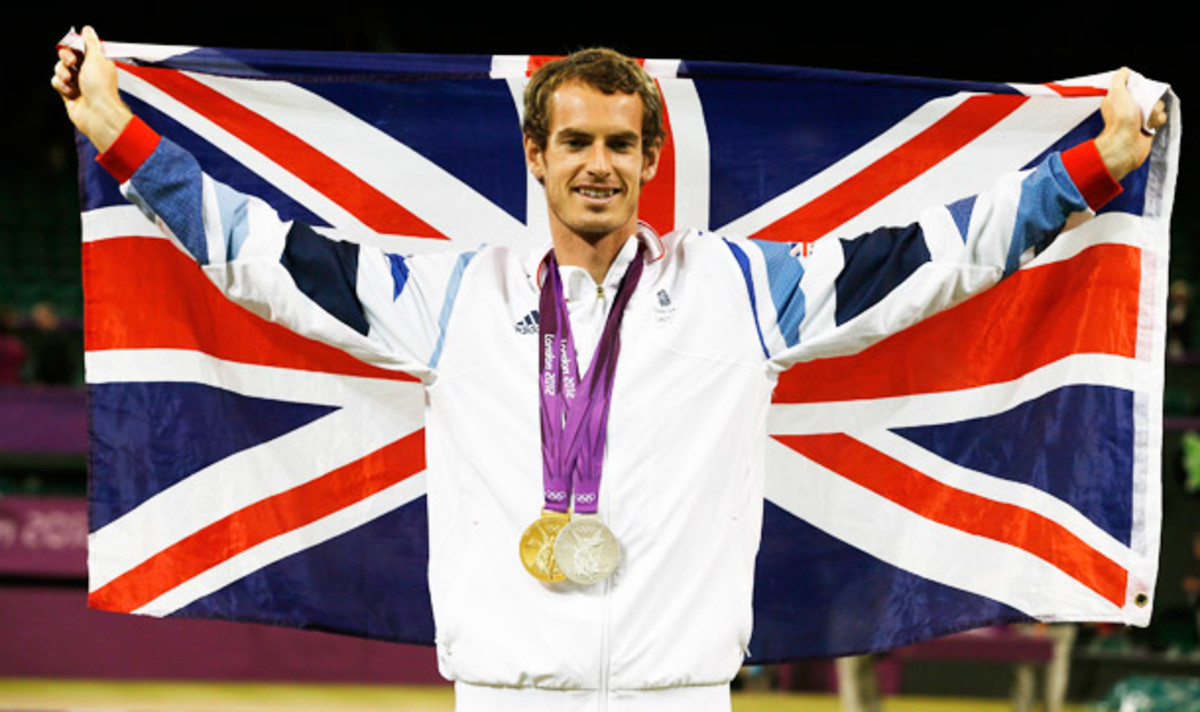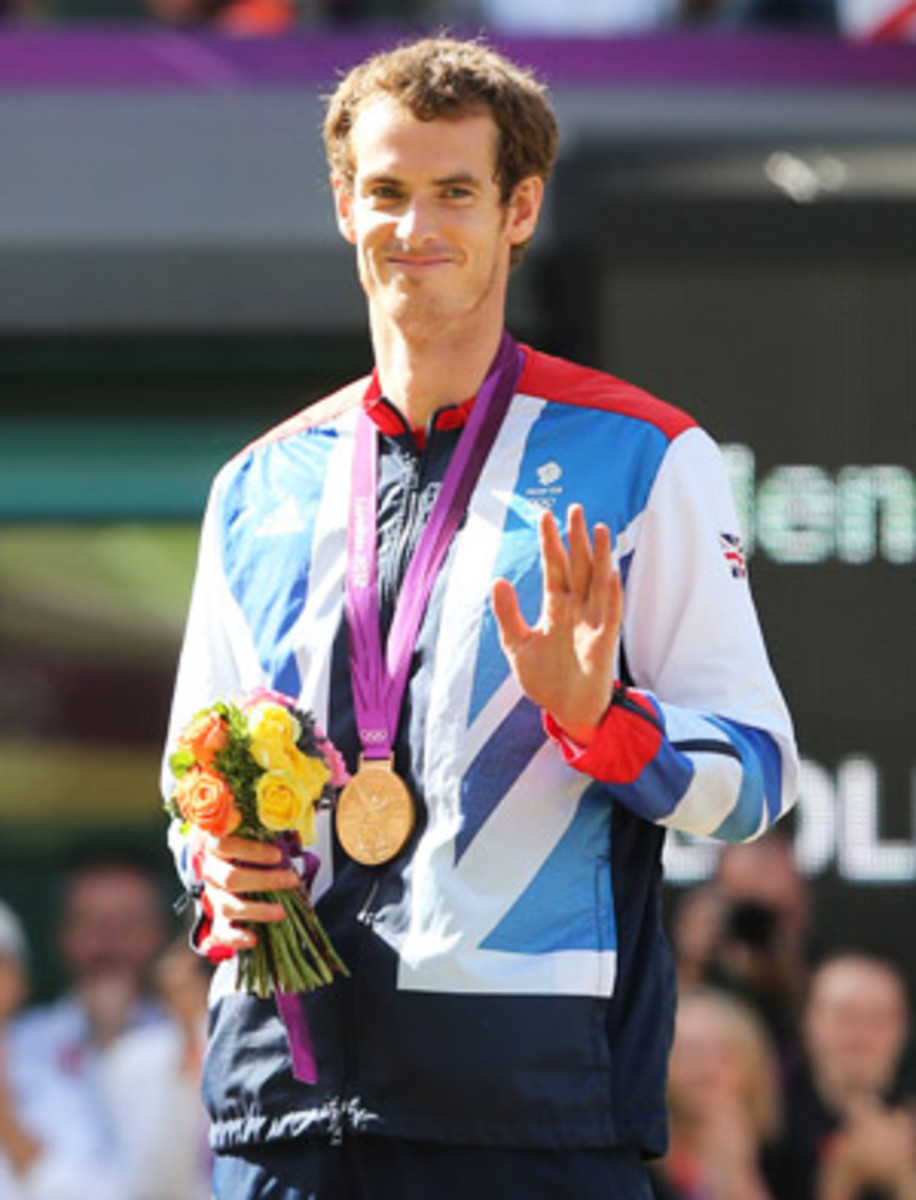The Toss: Andy Murray turning new page, or golden aberration?

Andy Murray took down the past two ATP No. 1s, Novak Djokovic and Roger Federer, to capture Olympic gold. (Reuters)

Olympic tennis has come and gone, and the ATP's power structure was disrupted, if ever so slightly, by Andy Murray, the fourth wheel at the Big Three party who broke through for singles gold. But home-court advantage at the Olympics is a rare thing, so it's fair to wonder if Murray's results will translate to the Grand Slam events. This week, Hannah Wilks, a frequent contributor to Tennis.com based in Great Britain, joins The Toss to look at Britain's new golden boy.
Today's Toss: Was Andy Murray's breakthrough win at the Olympics a game-changer, or will it be business as usual with the Big Three?
Courtney Nguyen: Greetings from the Colonies, Hannah, and thanks for joining me for this week's Toss. I'm looking forward to your insight on this one as you're actually on the grounds in Britain as your country is successfully hosting the XXX Olympic Games.
I assume that you paid keen attention to Sir Andy Murray's triumphant trot to the gold medal last week, as he got a bushel-load of redemption in beating both Novak Djokovic and, more importantly, Roger Federer, for the biggest win of his career. Murray started the week under a thick British fog of speculation, as no one knew how he would bounce back from what was a soul-rendering loss to Federer just four weeks earlier at Wimbledon. Considering his history of going on month-long mental walkabouts, the doubts were understandable.
Yet there he was with a Stella McCartney-ized Union Jack emblazoned across his chest and wrists, laying a thorough beat-down on a sub-par Federer, at one point reeling off nine straight games against the Maestro. I've seen a lot of Murray through the years and I have never seen him put everything together to play a match like that. The serve was huge, the forehand was clicking, and he seemed so sure of himself out there. It was revelatory and, in my opinion, a sure sign that he's finally figured out how to handle his emotions and the pressure to unlock his potential.
But before I go on and wax poetic about Mr. Murray, I'd love to get your thoughts, assuming of course that you can tear yourself away from the velodrome, where the British domination and passion for track cycling absolutely fascinates me. What's the general tenor surrounding Andy in Britain right now? Will the win actually lead to even more pressure and expectation as we head toward the U.S.Open, knowing that he has this level of tennis in him? Or are y'all being stereotypically British and tempering yourself for the inevitable collapse?
Hannah Wilks: Thanks for having me, Courtney, and I hope you're well and enjoying our Olympics. Don't throw that 'Sir' around too casually, though. After the last month or so, there's a long list of strong candidates for knighthood.
Obviously I couldn’t be happier, as both a long-term Murray fan and a supporter of Team GB, with Murray bringing home the gold (or more accurately preventing it from leaving, I suppose). The nation right now is in love with our athletes, all of them, and hence Murray is enjoying a belated honeymoon with the British public, bathed in the kind of unconditional support that largely vanishes when Wimbledon comes around. It doesn’t hurt that it comes so soon after his loveable loser act after the Wimbledon final last month, either. But it remains to be seen whether anything about this experience is a game-changer, or whether it’ll forever remain an aberration – that weird week-and-a-half when the British liked Andy Murray, and each other, and ourselves.
What you have to remember about the London Olympics is that many of us were worried it would be a disaster. This is ‘broken Britain’, after all. The eight years since it was announced that London would host the 2012 Games have seen terrorist bombings and violent riots. Where sport is concerned, we’re justly famous for inventing and/or codifying sports, then being beaten at them by the rest of the world until the end of time. Most of our medals, historically, came from men with handlebar mustaches dashing off a couple of Olympic golds in croquet and poetry in between a garden party and oppressing half the world. You can see why it’s come as such a shock to us that not only are we hosting an amazing Olympics, but we’re actually winning gold medals at it.
I’m not suggesting that we’re quite at the stage of breaking out into cod-Dickensian song-and-dance routines in the middle of the street or anything – although another couple of golds might get us there – but there’s no denying that the nation’s been gripped by a most unusual attack of feeling good about ourselves, not the most popular pastime of the British people. We’ve already exceeded the number of gold and total medals we got in Beijing and ensured our most successful Games since 1908.
All of this giddy momentum crested last Saturday night when Jess Ennis, Mo Farah and Greg Rutherford all took gold in track-and-field events – particularly momentous because the events in which we’ve been most successful in recent years, such as rowing and cycling, have all involved sitting down, as other nations like to point out. (Incidentally, as a possible medal hopeful myself, I feel that LOCOG missed a trick by not making ‘Sitting Down’ an official event at London 2012.) It’s not a coincidence that Murray’s medal came the next day. You’re crazy if you think the tidal wave of energy and confidence that rolled over to Wimbledon last Sunday didn’t play a huge role in the final. Being part of a team, being whole-heartedly supported by the crowd in a way that will never happen again, and being by Murray’s standards positively under the radar – just one athlete competing among many, not the focus of all our national hopes and self-esteem as he is at Wimbledon - contributed to a unique environment in which to play and win. He played aggressive, confident tennis all week, not least in the final, but if you think all the spirit-of-Team-GB stuff is a bit airy-fairy, let me point out that the format of best-of-three matches and largely no days off was a lot closer to that of a Masters’ series event – which he’s won several of – than a Grand Slam – which he hasn’t.
I’ve always believed that Murray can win Slams. I’ll believe that until they prise the Union Jack flag from my cold dead fingers and bury me on Henman Hill (or whatever it’ll be by then). But if I didn’t already have that belief, the Olympics wouldn’t have instilled it in me. In a month or so the Olympics will be long over and Murray will be back on his own, trying to break into the hegemony of three of the best players in history: no team, no Union-Jack camouflage, no special inspiration, none of the energy that comes from a once-in-a-lifetime event. Just the same question: Will he win a Slam? We still don't have an answer.
Andy Murray went from tears after losing Wimbledon to smiles after winning the Olympics. (Zumapress)

Nguyen:Congratulations, Hannah, you have added to the GB medal count. You decisively win gold in the party-pooping event finals. You Brits have dominated this event in a way that makes the Chinese divers look like the Chicago Cubs.
I hear what you're saying though. The Olympics are not Grand Slam on a host of levels. Nine days vs. fourteen. Best of three (until the final) vs. best of five. Blind patriotic support vs. the unpredictable support of a multicultural crowd. While Murray still had to win six matches in nine days (as opposed to seven matches in fourteen), the best of three format had to have helped. Even if you cruise through six rounds to make the final of a Slam you're still playing at least 18 sets of tennis, often times under scorching, grueling conditions. At the Olympics you only have to play 10 sets to make the final and, at least at this Olympics, the grass kept the points shorter and the conditions were nothing close to sapping. Combine that with the unconditional support Andy received through the tournament and yes, I can see why one would want to dismiss the Olympic result as any sort of indicator for the future.
There are no sure things in tennis, but if I had to venture a wager, I'd still back his Olympic win as a sea-change moment, primarily because I don't see it as an isolated performance at an isolated tournament. One win over Roger Federer does not make a career. It's not like we didn't already know Murray could take down Federer. Going into the Wimbledon final he actually held an edge in their head-to-head record, notching nine wins to Federer's eight. As you said, it's easy to dismiss the Olympics as simply another Masters event, something that Andy's obviously won before.
But if you look at Murray's Olympic success in isolation then you're missing the big picture. He has been adamant over the years that he's a late bloomer, citing LeBron James as an example as recently as Wimbledon as a guy from whom much was expected and he just needed some time. Murray's career has completely borne that out. If you look at his results since he ascended to the No. 4 ranking in 2008, his Slam results have steadily improved and that is particularly apparent at Wimbledon, where he has matched or bettered his result every year he's played. If you take into consideration that the Olympic final was best of five and he beat Roger resoundingly in straight sets, there's a good argument to be made that at least as to Wimbledon, this win was a huge breakthrough.
Setting aside the tennis, it was Murray's ability to handle everything that was thrown at him last week that truly impressed, particularly in light of what happened on Centre Court a month before. Murray fans hadn't even finished rehydrating from that epic cry-fest before Andy was jumping around on Centre Court and flashing the biggest smile we've ever seen from him. It's that emotional turnaround that was most notable for me. We're used to "Emo-Andy", constantly feeling sorry for himself after big losses, doubting himself on the court, and retreating within himself like a turtle. But this Andy Murray, this Olympic Andy Murray, was different. He soaked in the crowd, he cracked jokes in press, he openly spoke of his disappointment and emotional recovery. And that was before he actually won. Murray says he feels more mature these days, that his demeanor has changed, and I believe him. Yes, his success at the Olympics was aided by the boisterous GB crowd, but I think that support mattered less than the outpouring of sympathy and support he received after the Wimbledon final. That he lost and was embraced whole-heartedly by the British public -- as well as your typically caustic media -- seemed to relax him and motivated him to do better.
Look, you know your people better than I do. Who knows, maybe in a few weeks time they'll forget the feel-good stories and choose to tear down the heroes that they spent seventeen days building up. If the U.S. Open rolls around and Britain doesn't care what happened a month earlier, then Murray is back where he started. But if there's one thing we've seen in 2012, it's that Murray hasn't reverted to old patterns despite being faced with familiar scenarios. Disappointing loss at the Australian Open in the semifinals? He bounces back to make the finals of Miami. Spotty clay season? He still makes the French quarterfinals on his worst surface, losing to David Ferrer (who is kind of good on clay). Go into Wimbledon without any wins on grass? Make the finals. Have your heart ripped out of your chest in front of your family and friends by a 30-year old Swiss guy who is still pretty darn good at tennis? Bounce back four weeks later to give as good as you got.
The game has always been there. But Murray's 2012 season, culminating in his Olympic triumph, has been a testament to his improved mental strength. Considering that's always been the knock against him, I say the positive reinforcement he got by winning the gold medal means a different Murray going forward.
Wilks: First of all, I’d like to thank you for what I can’t help but feel is a well-deserved gold medal in party-pooping. Although it’s always been my specialist discipline, this level of expertise in general negativity did not come overnight. I have to take a moment to thank the government, the British weather, global capitalism, the half-bottle of vodka I drank last night and most of all the generalized low-level mundane horror of existence. Without the support of all of them, I would never have managed to be quite this miserable.
[polldaddy poll=6452333]
Right. Where were we? I don’t on any level want to dismiss Murray’s gold. I want to slip gently into dreamland every night for the next four years cuddling the thought of it close like, well, a lump of gold. But you know as well as I do that sometimes, being a fan, you have to ruthlessly suppress any flicker of hope just to protect yourself from more disappointment. Maybe I’m doing that. Actually, I’m definitely doing that. But I do think there are legitimate grounds for caution, if not outright negativity.
For one thing, you can’t really tell me that you think the gold-medal match would have played out the same way if it had been a Slam final. As Murray himself said, Federer doesn’t know how to win an Olympic singles gold because he’s never done it. Murray’s unlikely to face an opponent who is on the same level terms where experience is concerned in a Slam final. Federer knows how to win those better than anybody. Not to mention that Djokovic and Nadal have a pretty fair idea, too. Even Juan Martin del Potro has a better idea. I’ve always felt that Murray’s biggest obstacle to winning a Slam is that he’s never won one. If he could get a lucky break with an inexperienced or less-than-GOAT player, then that would help (although I’m not suggesting he needs it). But there’s no denying that the hardest task in tennis is to get past two of the Big Three in best-of-five matches and Murray can’t simply blast those players off the court the way del Potro did in 2009. Even in the Olympic final, we saw his first-serve percentage and effectiveness plummet alarmingly after it had been brilliant all week and Murray is going to need his serve in a Slam final. If he can’t serve well for six matches, what makes you think he can do so for seven?
What's good for Murray is that although he’s getting older, tennis is getting older too. He’s not yet at risk of being squeezed between the Big Three and a hungry young generation of stars, because that young generation has yet to reveal themselves. But they will come, and while Murray is maturing, I would argue that the longer he goes without winning a Slam, the greater the pressure is. It’s not like the media are going to start ignoring him any time soon. In fact, we’ll all only expect more from him now that he has Olympic gold. That isn’t really a problem, because I don’t think Murray has ever particularly struggled with other people’s expectations for him. What could be a problem is those increased layers of expectation and desire inside the Murray psyche, which I assume already resembles a Salvador Dali put through the wringer. If you can’t imagine him getting tangled in knots by all of that and losing to some inspired veteran on day three of the U.S. Open, then I know you can imagine another loss to Federer, Nadal or Djokovic in the latter stages.
